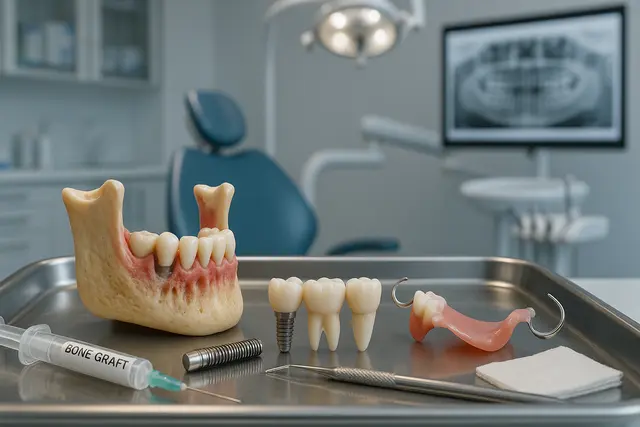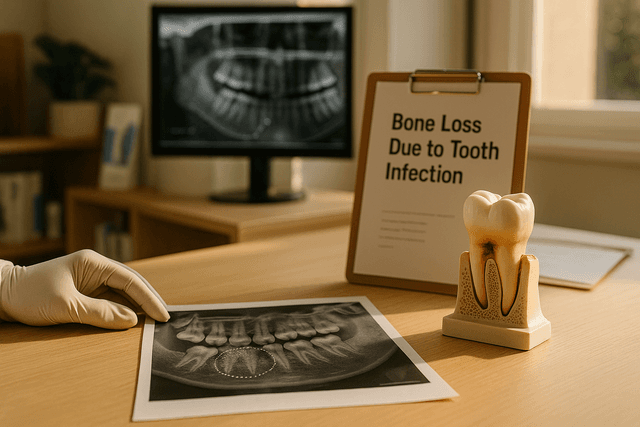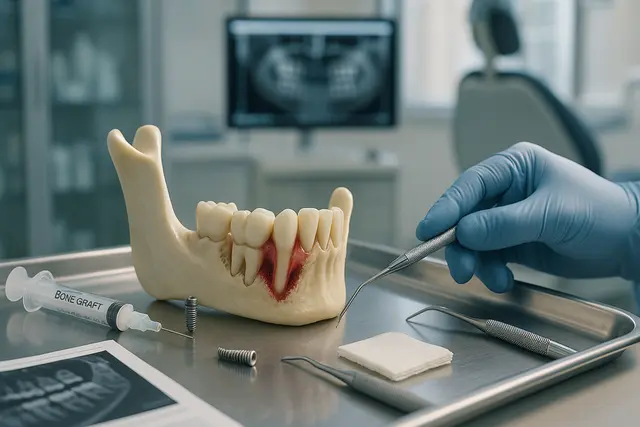Oral Health
6 min read
Jun 17, 2025
Can Toothache Cause Headache? What Your Pain Is Trying to Tell You
Ever had a pounding headache that mysteriously shows up just as a toothache starts flaring? You're not imagining things. The connection between toothaches and headaches is more real, and more common, than most people realize. Before you chalk it up to stress or lack of sleep, your body might be trying to tell you something important.

It starts with a dull throb in your jaw. Maybe it’s your molar. Maybe it's your temple. Maybe it's both, and now you're wondering why brushing your teeth suddenly feels like it’s connected to your forehead. You’re not alone. If you’ve ever had a toothache and headache at the same time, you’ve probably asked yourself: can a toothache cause a headache, or is this just some cosmic coincidence?
Spoiler alert: your tooth can absolutely mess with your head, literally. But before you start Googling scary diagnoses or popping over-the-counter pain relievers like candy, let’s unpack what’s really going on between your teeth and that stubborn headache.
Understanding Headaches: What’s Going On Up There?
A headache is more than just a nuisance. It’s your brain’s way of waving a red flag, except your brain technically doesn’t feel pain. Weird, right? What you’re actually feeling is the pain coming from nerves in the head, blood vessels, or the tissues surrounding the brain. That pain might be sharp, pounding, pressure-like, or throbbing pain, and the trigger can be anywhere.
Referred pain plays a major role here. That’s when pain experienced in one part of the body radiates to the head because the brain gets a little confused. And that’s where your tooth comes into the picture.
The Relationship Between Toothaches and Headaches: How Are They Linked?
Here’s the short version: yes, a toothache can indeed cause a headache. The longer version? It has a lot to do with the trigeminal nerve, which is basically the nerve MVP of your face. It covers your jaw, cheeks, and even part of your forehead. When you have a toothache, especially something intense like an abscessed tooth or a dental infection, that nerve can start throwing signals all over the place, including your noggin.
This explains the connection between toothaches and headaches and why people often feel tooth and head pain together. It’s not in your head (well, okay, it is, but it’s real).
Causes Toothaches: Common Culprits You Shouldn’t Ignore
Let’s talk about the usual suspects. A toothache isn’t just a random glitch, it usually comes from a dental issue that’s been brewing for a while. You might be dealing with:
Tooth decay (aka cavities)
A cracked tooth
An infected tooth
A dental abscess
Impacted or infected wisdom tooth
Each of these can irritate nearby nerves and tissue, leading to a headache. And if you’re experiencing persistent toothaches, your body is practically begging you to take action.
Headache From a Toothache: When Your Smile Sends Mixed Signals
The worst part? It’s not always obvious that your headache is caused by a tooth problem. Many people show up to the ER or their doctor thinking they have a migraine, only to find out it’s a toothache playing puppet master behind the scenes.
One telltale sign of a headache from a toothache is that it’s often one-sided, aka a one-sided headache. You might also feel jaw pain, pain when chewing, or tooth sensitivity around the tooth that’s the real troublemaker.
Conditions That Cause Pain and Headache: It’s Not Always the Obvious
A few sneaky conditions can also cause a headache when they mess with your dental health. Here’s a quick rundown:
Teeth grinding: Clenching or grinding your teeth, especially at night, can stress the temporomandibular joint (TMJ) and create an aching jaw and a splitting headache.
Sinus infections: Your sinus cavities sit right above your upper teeth. When they’re clogged, they put pressure on nearby nerves, hello, facial pain, goodbye peace.
TMJ disorders: When the temporomandibular joint is inflamed or misaligned, it can mimic both a toothache and a tension headache.
Migraines: Sometimes, a migraine is just a migraine, but if it’s often accompanied by nausea, sensitivity to light, or sound, don’t rule out your teeth as part of the trigger list.
Toothache Cause Headache? Yes, and It Can Get Worse
Still skeptical that a toothache can cause a headache? Let’s paint a picture: you’ve got a dental infection in your lower molar. It’s been sore for a few days, but manageable. Then one day, bam, a severe headache hits. It’s throbbing, localized, and doesn’t ease up. That’s not just a coincidence. It’s the toothache cause taking your nervous system on a rollercoaster ride.
This type of referred pain may cause severe pain in your head, neck, and even behind your eyes. If left unchecked, an untreated dental issue can become systemic, yep, we’re talking infection in your bloodstream kind of serious.
What Tooth Pain Feels Like When It Triggers a Headache
When your tooth pain is the root cause (pun intended), it usually feels dull at first. As it builds, the headache symptoms might sneak in slowly or slam you out of nowhere. You might feel a pulsing at your temples, pressure in your sinuses, or a general ache that doesn’t quit.
And if you’re experiencing both a toothache and a headache simultaneously, you’re probably already piecing it together. The connection between toothaches and headaches isn’t a myth, it’s biology.
Don’t Ignore the Signs: Call a Dentist
Here’s the thing: ignoring a toothache is like ignoring a fire alarm because you don’t see flames yet. If you’re dealing with toothaches or headaches more than occasionally, it’s time to bring in a dental professional. They can help pinpoint the source of your pain and fix the dental problem before it sets off more alarms in your body.
A dentist will check for cracked teeth, cavities, abscesses, or bite issues that could be causing both pain and headache, possibly even a fractured cusp or the need for a root canal. If the pain is due to referred pain from a tooth or jaw issue, early treatment can alleviate the pain and get your life back on track. You might even start with a new patient dentist appointment.
And in more complex cases, a trusted oral surgeon may step in to help.
Gum Trouble and Its Role in Head Pain
Don’t underestimate your gums. Infections or inflammation in the gum tissue, especially gum disease, can also trigger discomfort that moves into your jaw and head. Remember, the health of your gum line directly impacts the nerves around your tooth, and that connection might be the missing link between your headache and your smile.
How to Prevent Toothaches That Trigger Headaches
Prevention isn’t flashy, but it works. Try these tips to keep your dental health (and your head) in check:
Brush your teeth twice a day with fluoride toothpaste.
Floss daily, seriously.
Skip the jaw-clenching. If you grind your teeth, consider a nightguard.
Keep your regular dental check-ups.
Watch for signs of tooth pain, gum tenderness, or swelling.
Hydrate. Dehydration can cause headaches, too.
Reduce stress, which can lead to both grinding and tension headaches.
When to Worry About a Headache and Toothache
If your headache is accompanied by fever, swelling, or severe pain, don’t wait. Those could be signs of a serious dental infection or something that needs urgent treatment. Same goes for any headache that doesn’t respond to your usual remedies or comes on suddenly and intensely.
In other words, don’t play dentist or neurologist at home. Your head and your teeth are too important for guesswork.
Can a Toothache Really Cause a Headache?
Yes, a toothache can absolutely trigger a headache, especially when the pain involves the trigeminal nerve, which serves both the teeth and large areas of the face and head. Inflammation or infection in a tooth can send pain signals that radiate to your temples, jaw, or forehead, causing a headache that feels unrelated at first.
How Do I Know If My Headache Is Caused by a Tooth Problem?
If your headache is one-sided, comes with jaw or tooth pain, or worsens when chewing or clenching, a dental issue might be the cause. Signs like a persistent toothache, sensitivity, or facial pressure may also suggest that the source of your headache is oral, not neurological.
What Dental Conditions Can Lead to Headaches?
Common dental culprits include cavities, cracked teeth, gum disease, abscesses, impacted wisdom teeth, and teeth grinding. These conditions can irritate nerves in the face and jaw, leading to referred pain that shows up as headaches or even facial tension.
When Should I See a Dentist for a Toothache and Headache?
If you have recurring headaches along with tooth or jaw pain, swelling, or sensitivity, it’s time to see a dentist. These symptoms may point to an infection or dental issue that could worsen without treatment, and may even impact your overall health if left unchecked.
Read Next
Related Posts

Oral Health
Tooth Replacement Options to Prevent Bone Loss
Losing a tooth isn’t just about appearance, it can have a lasting impact on your oral health, jawbone strength, and overall quality of life. When teeth go missing, the jawbone begins to shrink, which can change your bite, your facial structure, and even your confidence. Fortunately, modern dentistry offers several effective solutions to replace missing teeth and prevent further bone loss.
4 min read
Sep 26, 2025

Oral Health
Bone Loss Due to Tooth Infection Explained: What It Means for Your Oral Health
A tooth infection isn’t just about pain, it can quietly damage the tissues around a tooth and even erode the jawbone that supports your smile. This guide explains how infections start, why they can lead to bone loss, the warning signs to watch for, and the treatments that can stop the spread and rebuild lost support.
5 min read
Sep 25, 2025

Oral Health
Understanding Bone Loss in Teeth: Causes and Treatments That Work
Bone loss in teeth is a silent threat that can compromise your smile, facial structure, and overall oral health. While it often goes unnoticed in the early stages, it can lead to serious consequences if left untreated. Understanding what causes dental bone loss, and how to prevent or manage it, is key to maintaining a strong, healthy foundation for your teeth.
5 min read
Sep 25, 2025
Don’t have time to research every dentist around you?
See why 30k+ patients trusted us